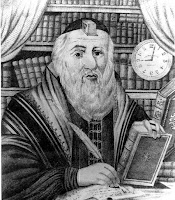 |
| Portrait Of The Gaon From Wikipedia |
The Vilna Gaon (Rabbi Elijah ben Solomon Zalman, 1720–1797), widely regarded as one of the greatest Torah scholars in Jewish history, is often portrayed as the embodiment of pure Torah devotion—immersed day and night in Talmud, halakha, and Kabbalah. Yet this image only tells part of the story. For while the Vilna Gaon indeed held Torah wisdom as supreme, he did not dismiss the value of secular knowledge. On the contrary, he saw wisdom outside the Torah—particularly in fields like mathematics, astronomy, linguistics, and philosophy—as vital tools in understanding God's world and enhancing Torah study.
The Gaon maintained that all wisdom ultimately flows from the Torah. In his view, the Torah is the blueprint of creation, and thus any truth found in the natural world reflects its divine origin. Yet he acknowledged that secular disciplines possess intrinsic value, especially when they serve to illuminate Torah concepts. For example, he is quoted as saying:
“To the extent that a person lacks knowledge of the sciences, he will lack one hundred-fold in understanding of Torah.”
This stunning statement reveals not just a tolerance for secular study, but a demand for it—when it serves to deepen one's grasp of Torah. The Gaon was particularly drawn to mathematics and astronomy, which he believed were necessary to fully understand complex Talmudic discussions (e.g., eruvin, kiddush hachodesh, zemanim). In this, he echoed earlier authorities like Maimonides, who integrated Greek logic and Aristotelian philosophy into his Torah worldview.
The Vilna Gaon’s openness to external wisdom was rooted in his fierce opposition to what he saw as shallow religiosity. He warned against those who hide behind a façade of piety while remaining ignorant of both the broader world and deeper Torah. In his commentary on Mishlei (Proverbs), he rebukes those who dismiss all forms of secular wisdom as “foreign” or “profane,” insisting that such attitudes stem from laziness, not sanctity.
One of the most underappreciated aspects of the Gaon’s genius was his interest in languages. He emphasized the importance of mastering Hebrew grammar (dikduk), and even encouraged knowledge of other languages such as Greek and Latin, to better understand ancient texts and interpretations. He believed that linguistic precision was not a luxury but a necessity in unlocking the depths of Torah.
As a kabbalist, the Gaon saw all disciplines—whether sacred or secular—as part of a unified divine order. In his Kabbalistic writings, particularly Safra de-Tzeniuta and his commentary on the Zohar, the Gaon wove together mystical teachings with scientific ideas. He believed that the study of creation—ma’aseh bereishit and ma’aseh merkavah—required an understanding of the natural sciences, which are not external to Torah but expressions of it in physical form.
The Vilna Gaon’s approach to wisdom outside the Torah was neither defensive nor apologetic. He did not view secular studies as a concession to modernity, but as an authentic extension of Torah itself. To him, the world was not divided between the sacred and the profane, but between the true and the false, the deep and the superficial. In an age when Jewish life often feels caught between isolation and assimilation, the Gaon’s vision offers a powerful model: a fearless pursuit of truth, rooted in Torah but open to all wisdom, wherever it may be found.
Sources:
Even Shleimah – This is a collection of the Vilna Gaon’s teachings, compiled by his student Rabbi Shmuel of Shklov. It includes many of the Gaon's philosophical and ethical ideas, and hints at his broader intellectual openness. While not focused exclusively on secular knowledge, it reflects his integrated worldview.
-
Kol HaTor – Attributed to the Gaon’s student Rabbi Hillel Rivlin, this mystical work discusses the Gaon’s messianic ideas, including the importance of understanding the natural world as part of the redemptive process. It includes references to the role of scientific knowledge in bringing the Geulah (Redemption).
-
Ma’aseh Rav – A biographical collection of customs and teachings of the Gaon by Rabbi Yissachar Ber, which includes testimonies about his interest in sciences like mathematics and astronomy.
-
Introduction to Sefer Eliyahu (Pe'at HaShulchan) – Written by Rabbi Yisrael of Shklov, another of the Gaon’s students, this introduction describes the Gaon’s mastery of multiple disciplines, including algebra, geometry, and other sciences, and how he used them in his Torah learning.
If you're looking for just one place to see his view most directly, start with his commentary on Mishlei 1:7, often found in traditional printings of Mishlei with Biur HaGra. That's where his most famous quote on secular knowledge is located.

REPUBLISHED
https://blogs.timesofisrael.com/the-vilna-gaon-was-open-to-all-wisdom-wherever-it-may-be-found/


